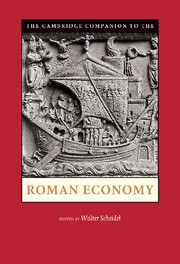Book contents
- Frontmatter
- Contents
- List of Figures
- Note on the Contributors
- Abbreviations
- The Roman world at the time of Marcus Aurelius
- 1 Approaching the Roman economy
- Part I Theory
- Part II Labor
- Part III Production
- Part IV Distribution
- 10 Predation
- 11 Transport
- 12 Urbanism
- 13 Money and finance
- 14a A forum on trade
- Part V Outcomes
- Further reading*
- Bibliography
- Index
13 - Money and finance
from Part IV - Distribution
Published online by Cambridge University Press: 05 February 2013
- Frontmatter
- Contents
- List of Figures
- Note on the Contributors
- Abbreviations
- The Roman world at the time of Marcus Aurelius
- 1 Approaching the Roman economy
- Part I Theory
- Part II Labor
- Part III Production
- Part IV Distribution
- 10 Predation
- 11 Transport
- 12 Urbanism
- 13 Money and finance
- 14a A forum on trade
- Part V Outcomes
- Further reading*
- Bibliography
- Index
Summary
The development of Rome and the Roman Empire would have been impossible without the development of money. The introduction of coinage was a direct consequence of Rome's expansion into Italy and soon formed a close relationship with Roman imperialism. Coined money was the medium with which the Roman armies were paid and most tributes from the provinces extracted, while imperial conquest secured control over a growing number of gold and silver mines as well as expanding the geographical radius of monetary relationships. Culturally, Roman money owed much to the Greek model, or rather, what it had grown into during the Hellenistic period: the idea of coinage; the idea of bronze coins as fiduciary money (money not backed up by ‘absolute’ value); the exchange of coins between different monetary systems; banks as places for money-changing, safekeeping of deposits, managing of payments, and making of loans; and, above all, some fundamental rules of contractual law that made credit and cashless transactions possible among a wide group of people. The Greek influence on Roman monetary practice is reflected in many Latin financial terms, such as mensa (table) for bank like the Greek trapeza also meaning table. Certain types of loan contract and banking procedures carried transliterated Greek names, such as sungrapha for witnessed loan contracts, and chirographum referring originally to an informal hand-written contract. Some terms were translated from the Greek, such as perscriptio for the Greek term diagraphe, meaning written order of payment.
- Type
- Chapter
- Information
- The Cambridge Companion to the Roman Economy , pp. 266 - 286Publisher: Cambridge University PressPrint publication year: 2012
- 23
- Cited by



